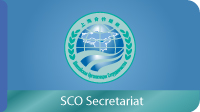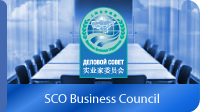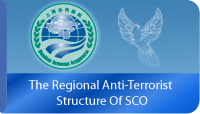|
|
 |
| SCO Energy Club: what will it be like? |
| 28.10.2009 14:45 |
|
|
|
Maxim Krans, a columnist for InfoSCO
In Moscow at the roundtable organized by the SCO Business Council under the auspices of the Ministry of Energy of the Russian Federation and the InfoSCO’s sponsorship information, the energy problem was hotly discussed. This subject is global, disturbing, and the new impetus for its development was given by the “the IV International Energy Week”. More than fifty experts, scientists, representatives of government and business institutions (national and foreign) took part in a candid, sharp discussion unfolded at this interesting meeting that was held in the World Trade Centre. Diplomats from the Shanghai Cooperation Organization countries accredited in the Russian capital were present as well.
Elaboration of a single strategic policy of the Shanghai Cooperation Organization in the energy sphere is one of the most actual practical tasks, and it is the SCO Energy Club that is called to solve it. Discussions about what this structure must be, what functions it will perform, have been already held for some years. Are there any possibilities for a consensus in this matter and what barriers are there on the way for its achievement? The participants of the roundtable tried to answer these questions.
Secretary of the SCO Business Council, Sergey Kanavsky noted, opening the discussion: “Our meeting actually continues the discussion that has been recently held in Beijing during a summit of Heads of government of the Shanghai Cooperation Organization and the Commercial and Industrial Forum. By the way, the forum was attended by over 500 companies representing all countries of our organization, and at least half of them are dealing with energy. The Shanghai Organization gives large opportunities in this field. They are energy security, collaboration in various kinds of energy, collaboration between corporations engaged in extraction and transportation of raw materials. Indeed the energy theme includes many various aspects, SCO is to solve today”.
Leonid Moiseev, Special Representative of the President of Russia for SCO affairs, national coordinator of SCO from Russia underlined that “this is, practically, the first informal meeting, called to discuss energy problems of today in the space of SCO” and reminded the participants of the events preceding the question.
The idea of opinion exchange concerning prospects of cooperation in the energy sphere of the organization member and observer states, as well as a wider circle of regional players was born some years ago. It reflected objective realities such as the availability on the territory of the Shanghai Six states of huge, on a world scale, hydrocarbon reserves, hydroelectric resources, and uran deposits.
But within the organization not only world leading hydrocarbon producers are represented, but also their biggest consumers. Furthermore, as Leonid Moiseev reminded, the SCO space is 3/5 of the territory of Eurasia. Aside from that, its member states are in an active phase of economic development and are attractive in respect investments. Moreover oil- and gas pipelines are operating or being built in the region.
For the first time the model of a new SCO structure – a mechanism for “running-in” a wide range of ideas and proposals in the energy sphere – was advanced in December 2005 in Tashkent, at the conference “Central Asian energy market”. In June 2006 a proposal to create the SCO Energy Club was expressed at the summit in Shanghai in the Russian President’s speech. It was supported by other Heads of state. And already some months later the first meeting of the ad hoc fuel-energy complex working group took place, and a year later in Moscow – the first meeting of energy ministers of the SCO states.
Parallel to this official channel the theme of energy cooperation continued to be discussed also on the “second track”, i.e. on an informal level. Thus, at the roundtable in Tashkent the Energy Club’s concept was formulated. According to the participants, it could represent a platform, where the member states should have a possibility to substantially discuss on regular basis the organization’s energy strategy, joint implementation of projects in the sphere of hydrocarbons exploring, production, processing, transportation and transit, rational use of water-power resources.
“The Energy Club, in concept, is called to harmonize national energy strategies and development plans, to give a platform for discussion of common programs and projects, as well as to solve questions connected with their implementation,” said Leonid Moiseev. “This club or forum – no matter how it is called – can become a brain and information trust, which would contribute to coordination of long-term programs in the sphere of the fuel-energy complex. It could in perspective elaborate common strategic guidelines, help to create general infrastructure, which should serve to implementation of joint projects, as well as persist in its position in foreign economic policy. And it is reasonable at that to involve in this mechanism’s work the SCO observer states too”.
The Shanghai Organization’s market is one of the most dynamically developing in the world. Thus, according to the International Energy Agency’s estimates, growth in demand for oil in main countries of the Asia-Pacific Region till 2025 will pass ahead of the worldwide one by a quarter, and demand for gas will increase 1.8 times.
Gazprom Open Joint-Stock Company plays one of key roles among Russian participants of this enormous market. Alexey Mastepanov, Advisor to the BOD Deputy Chairman of Gazprom told at the roundtable about its contribution to SCO’s energy. “Our corporation has established long-term partnership relations with many biggest companies of the SCO countries, and with some of them we have entered into relations of strategic cooperation,” he underlined. “This points to the fact that we have general understanding of problems of world energy development, energy security and possible ways of their solution. This is also evidence of high level political and economic relations established between our states.” Mastepanov told that today on the territory of Russia and other SCO countries Gazprom is implementing a few score of large energy projects – national, bilateral, multilateral ones. For coordination of international activity an ad hoc working group has been created in the corporation for cooperation with the SCO Business Council.
“We are sure that by joint efforts many tasks faced us in the energy sphere will be solved,” Mastepanov noted and expressed Gazprom’s attitude towards the idea of an Energy Club creation: “We come out for a place, where we could in informal conditions, in detail, at expert level to discuss and carefully study every single problem prior it enters the sphere of official discussion.”
This idea was also eagerly supported by Van Chun Zhun, representative of the Committee for International Trade Cooperation of PRC in the Russian Federation. According to him, the Energy Club would be profitable for all the SCO countries. He believes that this platform can raise the cooperation both between energy companies and the organization member states to a much higher level .
And Vladimir Shvediuk, president of the Kazakhstan national part of the SCO Business Council outlined a range of questions to be solved by the expert community and heads of the SCO countries as well. What will our energy club be, what “filling” will we put in this notion? What organizational and legal form will this platform have? Will it work on continuing basis and if so, then at what representative level? “I understand that within the roundtable we will not answer all these questions so far, but in perspective I find it very important for achievement of the ultimate aim and specific solutions,” he said. “Our energy giants find ways for themselves in bilateral cooperation and successfully overcome existing difficulties, but one should not forget small and medium-sized businesses. This is what we need for to reach a consensus in identifying what the SCO Energy Club should be.”
Another participant of the discussion - Doctor of Economics Andrey Ostrovsky, deputy director of the Russian Academy of Sciences' Institute of Far East Studies has dwelled on one of the most promising energy markets of SCO – the Chinese one. He reminded that PRC ranks second after the USA by energy carriers consumption, and this is 2 billion tons of equivalent fuel. Here the overall amount of discovered reserves in the country is as follows: mineral carbon – 326 billion tones, oil – 2.8 billion tones, and gas – 3.2 trillion cubic meters. But in the XXI century oil consumption there is already noticeably passing ahead of its production, and in the short run the same will happen with gas too. The problem of energy carrier delivery faces China especially with the current GDP growth rate.
The scientist raised before the participants the following questions: is not Russia late with its proposals of energy resources supplying to China and is not it time for our oil and gas companies to more actively advance to Eastern markets? Because China has already begun to receive condensed gas from Australia, and our gas producers, according to him, are acting in this direction not sufficiently energetically.
His colleague Vladimir Matveev, Leading Researcher of the Institute of Far Eastern Studies, Russian Academy of Science told the same thing at the roundtable. He, particularly, touched upon the issues of cooperation in the energy sphere between PRC and the Central Asian countries. The point is that in recent years the PRC government has been assigning an increasing part to nourishment of its gas-transport system at the expense of countries of this region. PRC is trying to acquire access to resources of Uzbekistan, Kazakhstan and Turkmenistan, actively buying up assets of local companies to have there guaranteed volumes of extraction and ensure raw material supplies at lower prices at the expense of some minimizing the tax burden.
And in December building a gas pipeline from Turkmenistan to China will be completed. Some analysts saw in it some sort of threat to the Russian Gazprom. According to Matveev, “commissioning of this gas pipeline will add certain competition to Central Asian gas export between Russia and China, but in the immediate future - under the conditions of increase in demand for this raw material in Europe and its price rise there - the western direction of its transportation will be however more preferable than the estern one. All the more so that in PRC the demand for import gas just begins to grow.”
It should be noted that strategically also for Russia it is profitable to cooperate with the Central Asian countries in this sphere. According to experts, gas consumption in our country is growing more rapidly, than it is built into the Energy strategy of Russia till 2020. And European consumers as well, to all appearance, will soon restore previous levels of supplies. At the same time, in accordance with this strategy, in 2020 we must extract 700 billion cubic meters of gas. However if the current tendencies of gas consumption remain the same, the optimal volume of extraction in ten years must make up about 900 billion cubic meters. And it may not be true that we will be able to ensure such a volume. Cooperation with oil-and-gas companies from Kazakhstan, Turkmenistan and Uzbekistan will just enable Russia to carry out its obligations of delivery of raw material to foreign consumers and preserve its role on international energy resources markets.
In the course of the discussion its participants not once mentioned one of the biggest Russian-Chinese projects in the energy field – Eastern Siberia - Pacific Ocean oil pipeline (ESTO). Igor Surovets, director of the construction and investment projects department of the Transneft Open Joint Stock Oil Transporting Company told of its role in the development of energy cooperation between the two biggest economies of SCO.
He shaid that this pipeline will cardinally change the existing system of Russian energy carriers deliveries, traditionally oriented to the European zone. Surovets told that at the present time his company is completing the first stage of ESTO construction. This project is unique in its kind: its length will make up 5 thousand kilometers – from Taishet, through Skovorodino and Khabarovsk – to the Sea of Japan. Its finishing point is in the port of Nakhodka (Kozmino bay). It is unique also because it is running through the territories with difficult climatic conditions, with temperature drops from –60 to +50.
The representative of Transneft In December promised that the first tanker will be shipped at the terminal of Kozmino bay. And this pipeline’s branch line will go from Skovorodino to the Chinese city of Daqing. 15 million tons of oil will be annually delivered through it to China. This day next year it is planned to put this section into operation. “And we and our Chinese colleagues laying a pipe towards the Russian border on their part, will cope with our tasks,” Igor Surovets has no doubts.
Alexey Machulsky, representative of the MGIMO Center for East Asian and SCO studies added some skepticism into the discussion: “As far as I can judge by our discussion, we still maily use formulations of national interests and bilateral cooperation, and not collaboration in the SCO format. And we want to set to solve bilateral projects in the energy field. That is why we have to match national approaches and principles of an Energy Club creation, which would raise the energy dialogue to a much higher level. And our approaches to forming this new SCO mechanism often differ – from a clear, structured organization – to some sort of fuzzy structure taking a configuration of a discussion club, and nothing more than that. The Russian approach is the following: it must be however a sufficiently tough association of supranational nature, which supposes delegation of some sovereign powers to it.
For example, Uzbekistan holds absolutely contrary opinion. Maybe we should act, as a Chinese aphorism says “from the simple to the complex” and look for points of contact where it is necessary, not running ahead, not overtaking events?”
But Sergey Kanavsky did not agree with this opinion. “Yes, it is always easier for two sides come to an agreement, and when they are more, there are often problems,” he noted. “But recently we have observed growth of cooperation both in bilateral and multilateral formats. Though they are joint projects of the two countries, it is only the first building block – then they will be able to become trilateral and multilateral. For example, somebody wants to make his contribution by new technologies, and somebody else – by investments… In any case the matter is about cooperation within our organization. Only mathematical approach is not suitable here. We are just acting like this: from the simple to the complex”.
Sergey Lavrov, Head of the Vnesheconombank department for work organization in the SCO Interbank Association noted that there are such problems also in the Interbank Association already existing for five years: “And it is easier for us as well to find one partner for implementation of any project, than finance it on a multilateral basis. But on the other hand, I must say that each meeting within our association, irrespective of whether it had any specific results, gave a perfect possibility for mutual communication, exchange of information. If you wish, all the participant structures were filled with a general spirit of creation within our region, for the benefit of solution of really urgent problems of economic and social development of our states. I am sure that the Energy Club in various forms will be of use as well.”
It must be said that all the participants of the roundtable were unison in an opinion that creation of the SCO Energy Club in any case must contribute to closer cooperation of energy resources producers, their consumers and transit countries. This idea realization can transform SCO into a self-sufficient energy system both in global and regional contexts.
As was emphasized by Leonid Moiseev, summarizing the roundtable, the range of questions and problems to be solved during the Energy Club formation is large. As the present discussion showed yet again, they must be discussed in various formats, and the SCO Business Council just can become a perfect platform for discussions of this kind.
|
|
* Реестр иностранных средств массовой информации, выполняющих функции иностранного агента:
Голос Америки, Idel.Реалии, Кавказ.Реалии, Крым.Реалии, Телеканал Настоящее Время, Azatliq Radiosi, PCE/PC, Сибирь.Реалии, Фактограф, Север.Реалии, Радио Свобода, MEDIUM-ORIENT, Пономарев Лев Александрович, Савицкая Людмила Алексеевна, Маркелов Сергей Евгеньевич, Камалягин Денис Николаевич, Апахончич Дарья Александровна, Medusa Project, Первое антикоррупционное СМИ, VTimes.io, Баданин Роман Сергеевич, Гликин Максим Александрович, Маняхин Петр Борисович, Ярош Юлия Петровна, Чуракова Ольга Владимировна, Железнова Мария Михайловна, Лукьянова Юлия Сергеевна, Маетная Елизавета Витальевна, The Insider SIA, Рубин Михаил Аркадьевич, Гройсман Софья Романовна, Рождественский Илья Дмитриевич, Апухтина Юлия Владимировна, Постернак Алексей Евгеньевич, Общество с ограниченной ответственностью Телеканал Дождь, Петров Степан Юрьевич, Istories fonds, Шмагун Олеся Валентиновна, Мароховская Алеся Алексеевна, Долинина Ирина Николаевна, Шлейнов Роман Юрьевич, Анин Роман Александрович, Великовский Дмитрий Александрович, Альтаир 2021, Ромашки монолит, Главный редактор 2021, Вега 2021
* Сведения реестра НКО, выполняющих функции иностранного агента:
Фонд защиты прав граждан Штаб, Институт права и публичной политики, Лаборатория социальных наук, Фонд по борьбе с коррупцией, Альянс врачей, НАСИЛИЮ.НЕТ, Мы против СПИДа, Фонд защиты прав граждан, СВЕЧА, Гуманитарное действие, Открытый Петербург, Феникс ПЛЮС, Лига Избирателей, Правовая инициатива, Гражданская инициатива против экологической преступности, Фонд борьбы с коррупцией, Гражданский Союз, Российский Красный Крест, Центр Хасдей Ерушалаим, Центр поддержки и содействия развитию средств массовой информации, Горячая Линия, В защиту прав заключенных, Институт глобализации и социальных движений, Центр социально-информационных инициатив Действие, ВМЕСТЕ, Благотворительный фонд охраны здоровья и защиты прав граждан, Благотворительный фонд помощи осужденным и их семьям, Фонд Тольятти, Новое время, Серебряная тайга, Так-Так-Так, центр Сова, центр Анна, Проект Апрель, Самарская губерния, Эра здоровья, правозащитное общество Мемориал, Аналитический Центр Юрия Левады, Издательство Парк Гагарина, Фонд имени Андрея Рылькова, Сфера, Центр защиты СИБАЛЬТ, Уральская правозащитная группа, Женщины Евразии, Рязанский Мемориал, Екатеринбургское общество МЕМОРИАЛ, Институт прав человека, Фонд защиты гласности, Российский исследовательский центр по правам человека, Дальневосточный центр развития гражданских инициатив и социального партнерства, Пермский региональный правозащитный центр, Гражданское действие, Центр независимых социологических исследований, Сутяжник, АКАДЕМИЯ ПО ПРАВАМ ЧЕЛОВЕКА, Частное учреждение Совета Министров северных стран, Центр развития некоммерческих организаций, Гражданское содействие, Центр Трансперенси Интернешнл-Р, Центр Защиты Прав Средств Массовой Информации, Институт развития прессы - Сибирь, Фонд поддержки свободы прессы, Гражданский контроль, Человек и Закон, Общественная комиссия по сохранению наследия академика Сахарова, Информационное агентство МЕМО. РУ, Институт региональной прессы, Институт Развития Свободы Информации, Экозащита!-Женсовет, Общественный вердикт, Евразийская антимонопольная ассоциация, Чанышева Лилия Айратовна, Сидорович Ольга Борисовна, Таранова Юлия Николаевна, Туровский Александр Алексеевич, Васильева Анастасия Евгеньевна, Ривина Анна Валерьевна, Бурдина Юлия Владимировна, Бойко Анатолий Николаевич, Гусева Ольга Андреевна, Дугин Сергей Георгиевич, Пивоваров Андрей Сергеевич, Писемский Евгений Александрович, Аверин Виталий Евгеньевич, Барахоев Магомед Бекханович, Шевченко Дмитрий Александрович, Жданов Иван Юрьевич, Рубанов Роман Викторович, Шарипков Олег Викторович, Мальсагов Муса Асланович, Мошель Ирина Ароновна, Шведов Григорий Сергеевич, Пономарев Лев Александрович, Каргалицкий Борис Юльевич, Созаев Валерий Валерьевич, Исакова Ирина Александровна, Исламов Тимур Рифгатович, Романова Ольга Евгеньевна, Щаров Сергей Алексадрович, Цирульников Борис Альбертович, Халидова Марина Владимировна, Людевиг Марина Зариевна, Федотова Галина Анатольевна, Паутов Юрий Анатольевич, Верховский Александр Маркович, Пислакова-Паркер Марина Петровна, Кочеткова Татьяна Владимировна, Чуркина Наталья Валерьевна, Акимова Татьяна Николаевна, Золотарева Екатерина Александровна, Рачинский Ян Збигневич, Жемкова Елена Борисовна, Гудков Лев Дмитриевич, Илларионова Юлия Юрьевна, Саранг Анна Васильевна, Захарова Светлана Сергеевна, Аверин Владимир Анатольевич, Щур Татьяна Михайловна, Щур Николай Алексеевич, Блинушов Андрей Юрьевич, Мосин Алексей Геннадьевич, Гефтер Валентин Михайлович, Симонов Алексей Кириллович, Флиге Ирина Анатольевна, Мельникова Валентина Дмитриевна, Вититинова Елена Владимировна, Баженова Светлана Куприяновна, Исаев Сергей Владимирович, Максимов Сергей Владимирович, Беляев Сергей Иванович, Голубева Елена Николаевна, Ганнушкина Светлана Алексеевна, Закс Елена Владимировна, Буртина Елена Юрьевна, Гендель Людмила Залмановна, Кокорина Екатерина Алексеевна, Шуманов Илья Вячеславович, Арапова Галина Юрьевна, Пастухова Анна Яковлевна, Прохоров Вадим Юрьевич, Шахова Елена Владимировна, Подузов Сергей Васильевич, Протасова Ирина Вячеславовна, Литинский Леонид Борисович, Лукашевский Сергей Маркович, Бахмин Вячеслав Иванович, Шабад Анатолий Ефимович, Сухих Дарья Николаевна, Орлов Олег Петрович, Добровольская Анна Дмитриевна, Королева Александра Евгеньевна, Смирнов Владимир Александрович, Вицин Сергей Ефимович, Золотухин Борис Андреевич, Левинсон Лев Семенович, Локшина Татьяна Иосифовна, Орлов Олег Петрович, Полякова Мара Федоровна, Резник Генри Маркович, Захаров Герман Константинович
* Единый федеральный список организаций, в том числе иностранных и международных организаций, признанных в соответствии с законодательством Российской Федерации террористическими:
Высший военный Маджлисуль Шура, Конгресс народов Ичкерии и Дагестана, Аль-Каида, Асбат аль-Ансар, Священная война, Исламская группа, Братья-мусульмане, Партия исламского освобождения, Лашкар-И-Тайба, Исламская группа, Движение Талибан, Исламская партия Туркестана, Общество социальных реформ, Общество возрождения исламского наследия, Дом двух святых, Джунд аш-Шам, Исламский джихад, Аль-Каида, Имарат Кавказ, АБТО, Правый сектор, Исламское государство, Джабха аль-Нусра ли-Ахль аш-Шам, Народное ополчение имени К. Минина и Д. Пожарского, Аджр от Аллаха Субхану уа Тагьаля SHAM, АУМ Синрике, Муджахеды джамаата Ат-Тавхида Валь-Джихад, Чистопольский Джамаат, Рохнамо ба суи давлати исломи, Террористическое сообщество Сеть, Катиба Таухид валь-Джихад, Хайят Тахрир аш-Шам, Ахлю Сунна Валь Джамаа
* Перечень общественных объединений и религиозных организаций в отношении которых судом принято вступившее в законную силу решение о ликвидации или запрете деятельности:
Национал-большевистская партия, ВЕК РА, Рада земли Кубанской Духовно Родовой Державы Русь, Асгардская Славянская Община Асгардской Веси Беловодья, Славянская Община Капища Веды Перуна, Мужская Духовная Семинария Староверов-Инглингов, Нурджулар, К Богодержавию, Таблиги Джамаат, Русское национальное единство, Национал-социалистическое общество, Джамаат мувахидов, Объединенный Вилайат Кабарды, Балкарии и Карачая, Союз славян, Ат-Такфир Валь-Хиджра, Пит Буль, Национал-социалистическая рабочая партия России, Славянский союз, Формат-18, Благородный Орден Дьявола, Армия воли народа, Национальная Социалистическая Инициатива города Череповца, Духовно-Родовая Держава Русь, Русское национальное единство, Древнерусской Инглистической церкви Православных Староверов-Инглингов, Русский общенациональный союз, Движение против нелегальной иммиграции, Кровь и Честь, О свободе совести и о религиозных объединениях, Омская организация Русское национальное единство, Северное Братство, Клуб Болельщиков Футбольного Клуба Динамо, Файзрахманисты, Мусульманская религиозная организация п. Боровский, Община Коренного Русского народа Щелковского района, Правый сектор, Украинская национальная ассамблея, Украинская повстанческая армия, Тризуб им. Степана Бандеры, Украинская организация «Братство», Свидетели Иеговы, О противодействии экстремистской деятельности, РЕВТАТПОД, Артподготовка, Штольц, В честь иконы Божией Матери Державная, Сектор 16, Независимость, Организация футбольных болельщиков «Фирма», Молодежная правозащитная группа МПГ, Курсом Правды и Единения, Каракольская инициативная группа, Автоград Крю, Союз Славянских Сил Руси, Алля-Аят, Благотворительный пансионат Ак Умут, Русская республика Русь, Арестантское уголовное единство, Башкорт, Нация и свобода, W.H.С., Фалунь Дафа, Иртыш Ultras, Русский Патриотический клуб-Новокузнецк/РПК, Сибирский державный союз, Фонд борьбы с коррупцией, Фонд защиты прав граждан, Штабы Навального
|






















Leave a comment